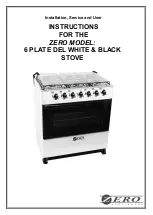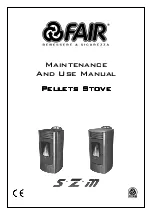
PELLET STOVES
Chapter 2
red
INSTALLATION AND USE MANUAL
page
16
Theoretical notions for installation
Technical service - Rights reserved - Reproduction prohibited
2.9.
OPERATING PROBLEMS CAUSED BY DRAUGHT
DEFECTS IN THE FLUE
Of all the weather and geographical conditions which affect the
operation of a flue pipe (rain, fog, snow, altitude a.s.l., exposure to
sunlight, direction of facing), the
wind
is unquestionably the most
decisive. In fact, along with thermal depression caused by the
difference in temperature inside and outside of the chimney, there is
another type of depression or over-pressure: dynamic pressure caused
by the wind. An updraft always increases depression and hence
draught. A crosswind increases depression provided the cowl has been
installed properly. A downdraft always decreases depression, at times
inverting it.
Besides the direction and force of the wind, the position of the flue and
the cowl with respect to the roof of the building and the surrounding
landscape is important.
The wind also influences the operation of the chimney indirectly by
creating high-pressure and low-pressure zones, not only outside the
building but inside as well. In rooms directly exposed to the wind
(2)
,
an indoor high-pressure area can be created which can augment the
draught in stoves and fireplaces, but it can be counteracted by the
external high pressure if the cowl is situated on the side exposed to the
wind
(1)
. On the other hand, in the rooms on the opposite side from
the direction of the wind
(3)
, a dynamic depression can be created
which competes with the natural thermal depression developed by the
chimney, but this can be compensated for (sometimes) by locating the
flue on the opposite side from the direction of the wind
(4).
IMPORTANT!
The operation of the pellet stove is noticeably
sensitive to the conformation and position of the flue
which is adopted.
Hazardous conditions can only be overcome by
suitable setting-up of the stove carried out by
qualified personnel.
1
2
3
4
E.g. Crosswind 2: 8 m/sec
Depression of 30Pa
E.g. Downdraft at 45° of
8m/sec. Overpressure of 17
Pa
1-2 = High-pressure zones
3-4 = Low-pressure zones
WIND
Least favourable points
Most favourable position
WIND
Downdraft
High-pressure
Low-pressure zone
















































